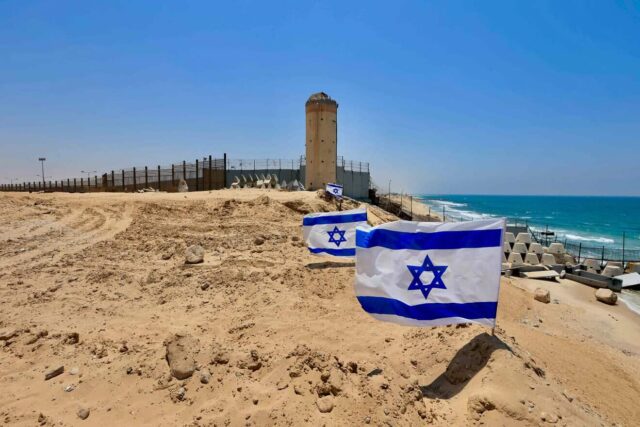
In the wake of the horrific condition of the last three Israelis released by Hamas from captivity in Gaza, U.S. President Donald Trump has stirred the pot again. He and Israeli Prime Minister Benjamin Netanyahu have ratcheted up the pressure on the terrorists with Israel taking clear steps toward the resumption of military operations in the Gaza Strip should the president’s conditions not be met.
Egypt announced that it might suspend the Camp David Accords, which provide billions to Cairo in U.S. military aid and cooperation, and has already violated the accords by moving military capabilities close to the Philadelphi Corridor. Jordan is considering, well, considering.
Hamas fired a rocket from the Gaza Strip toward Israel Thursday. The rocket, as many have, fell back into Gaza, killing a 14-year-old Palestinian boy. This followed consultations with Egypt and Qatar, both of which are terrified that fighting will resume, in which Hamas announced that it would adhere to the ceasefire agreement it has previously announced it would suspend.
There is a lot of posturing going on. They’re all nervous—and they should be. The president’s position on the ceasefire, the hostages and thoughts about moving civilians for the reconstruction of the Strip threaten long-held and expensive-but-useless platitudes about Palestinians, Arab states, Israel and history.
The glib shorthand of a “two-state solution,” for example, evolved from the notion that the problem of Palestinian refugees dates from Israel’s acquisition of Gaza, and Judea and Samara in 1967. Thus, they say, getting Israel out of those territories and making “Palestine” there would fix matters.
Trump has made it clear that he isn’t falling for it.
In his 2020 “Peace to Prosperity” Mideast plan event with Netanyahu and three Arab ambassadors, which presaged the Abraham Accords, he said: “It is time for the Muslim world to fix the mistake it made in 1948, when it chose to attack instead of to recognize the new state of Israel. The Palestinians are the primary pawn in this adventurism, and it is time for this sad chapter in history to end.”
The chapter could use a review.
In 1948, Israel was attacked by the combined forces of Egypt, Iraq, Transjordan, Syria, Lebanon, Saudi Arabia and Yemen—plus the Holy War Army of local irregular forces and an army of mixed Arab volunteers called ALA. To get the Arab civilians—more than 600,000—out of the way, they pushed them into third countries, promising that when Israel was destroyed, they could come back.
There is irony in that as well as misery.
They lost the war they started, and not one Arab country made permanent citizens of the Arab refugees. The population grew, penned in camps and living off the international dole. They were oppressed, repressed and angry in every one of those places—and for decent reason. (For an in-depth understanding, see The War For Return by Einat Wilf and Adi Schwartz.)
The Arabs lost the wars of 1967, 1973, plus the terror wars in Lebanon, the “intifadas” and the rocket wars. Egypt used Gaza as a duty-free station for its military from 1948 to 1967. Jordan illegally annexed Judea and Samaria in 1950, renaming it the West Bank, and making temporary citizens of many refugees. But in 1988, after the bloody Black September War of 1970 and decades of Palestinian terror against Hashemite rule, King Hussein renounced Jordan’s claim and withdrew citizenship from the Palestinian residents there. The king was known to call Israel’s then-Defense Minister Yitzhak Rabin “Jordan’s Security Minister for the West Bank.”
In later years, thousands of West Bank-origin Palestinians residing in Jordan proper had their citizenship revoked as well. According to Human Rights Watch, “Jordanian officials have defended the practice, as a means to counter any future Israeli plans to transfer the Palestinian population of the Israeli-occupied West Bank to Jordan.”
In the wider region, Lebanon expelled thousands of Palestinians in 1982; Kuwait expelled 287,000 Palestinian supporters of Iraqi dictator Saddam Hussein after the 1990 Gulf War; Syria kept them in camps, where they underwent what Amnesty International called a “surrender or starve” campaign in 2017. Iraq, also in 2017, revoked their refugee “rights.”
Trump’s announcement about Gaza reconstruction forces Arab states to face the fact that they never resettled Palestinians or wanted anyone else to do so either. It’s a bitter reminder that they have failed their Arab brothers since before Israel’s independence.
The good news is that not everyone is stuck.
Yousef al-Otaiba, the United Arab Emirates ambassador to Washington, termed the U.S. position “difficult,” but said, “We’re all in a solution-seeking business, we just don’t know where it’s going to land yet. I don’t see an alternative to what’s being proposed. I really don’t.”
He added, “If someone has one, we’re happy to discuss it, we’re happy to explore it, but it hasn’t surfaced yet.”
No one knows where it is “going to land.” But “solution-seeking” beats ignoring more than 80 years of Arab rejection and oppression of Palestinians, as well as the Palestinian terror-seeking, perpetual bloodletting response.
For everyone.

